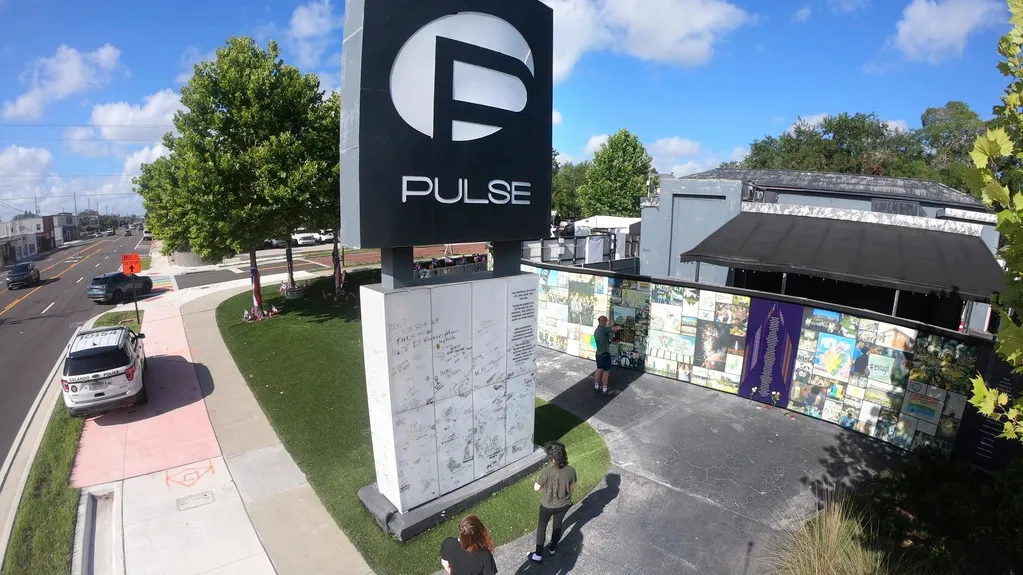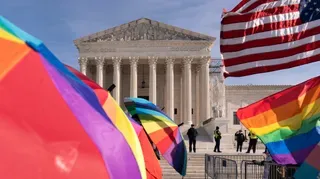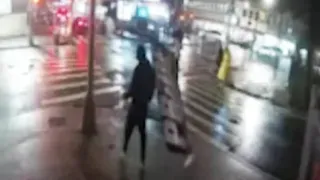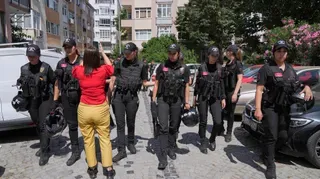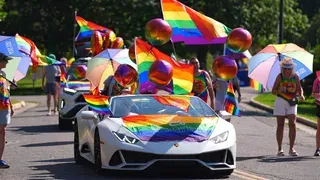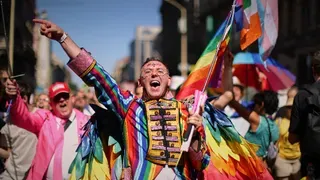May 9, 2008
Rustin breakfast empowers LGBT communities of color in civil rights, AIDS battles
Michael Wood READ TIME: 4 MIN.
Taking the stage holding a sign that bore the slogan, "I AM A MAN" at this year's Bayard Rustin Community Breakfast, Diego Sanchez at once paid tribute to the gay, black civil rights pioneer for whom the event is named and affirmed his own transgender identity.
"I carry this sign to give a shout out to black people who were told they were first property, then 3/5 of a man, and only through their own courage and proclamation, made the world see them as whole, loving, caring achieving, thinking, working praying men and women," he told a crowd of more than 200 at the John F. Kennedy Library and Museum in Dorchester on May 3.
Sanchez, an activist and expert on transgender health issues, delivered the keynote address at the 19th annual Bayard Rustin Breakfast, which was created by AIDS Action Committee (AAC) to recognize the role of LGBT communities of color in the fight against HIV/AIDS. Sanchez was the first transgender person in the event's history to deliver the keynote address.
Sanchez, AAC's director of public relations, noted that he was informed by the breakfast organizing committee that he had been selected to speak at the event last October, amidst the controversy over the decision by LGBT advocates in the U.S. House to strip protections for transgender people from the Employment Non-Discrimination Act (ENDA).
"I have to be honest," he said. "It hurt. It still hurts. It feels more like Non-Employment Discrimination Act; NEDA, not ENDA. Why can't we all remember the patriot Nathan Hale's quote, 'We shall all hang together or surely hang separately,'?"
But Sanchez was quick to note that trans people are lobbying legislators on Capitol for an inclusive ENDA, drawing laughter when he observed, "Then some [lawmakers] can say, 'I met one.' And others can say, 'I know many, and I believe trans people are equal humans.' Doesn't that sound like a page right out of civil rights history?"
Touching on the breakfast's theme, "The Mis-Education of Our World, HIV/AIDS 26 Years Later," Sanchez expressed his belief that in the debate on transgender civil rights "there is ample mis-information and mis-education on both sides of the road, regardless of which road one travels.
"And I think this struggle mirrors some other struggles, including struggles experienced in the time of Bayard Rustin and the Rev. Dr. Martin Luther King, Jr. over the same civil rights, except that they were about race, not gender. I also think this struggle echoes struggles we have endured around HIV/AIDS."
Sanchez noted that there is still no cure, vaccine or national strategy in the U.S. to end HIV/AIDS. Though he contended that Massachusetts has seen gains in addressing ethnic health disparities, "HIV prevention funding lags behind the pace of the epidemic. Barriers remain.
"But we are strong in our resolve to call them out and stop them altogether. We can do this because at the end of the day we are together. When tough things happen, we unite and no one can take that from us."
Following his speech, Cambridge Mayor Denise Simmons awarded Sanchez an official proclamation from the Cambridge City Council recognizing his work in the LGBT community. She also awarded him a key to the city, which she also said was "a key to our hearts."
Other honorees at the event included Gay and Lesbian Advocates and Defenders, which received the Belynda A. Dunn Award of Recognition for their years of legal advocacy on behalf of people with HIV/AIDS, and Glenn Williams, who most recently managed AIDS Action's ADAPT, a CDC-funded research project, who was recognized posthumously with the Bayard Rustin Award for Courage. Williams, who passed away last September, was long an outspoken advocate for HIV prevention in the black gay male community.
In accepting the Belynda Dunn award, GLAD executive director Lee Swislow received a standing ovation. In 2001, GLAD attorney Ben Klein represented Dunn, a longtime AIDS activist who was living with the virus, when her health insurer refused to pay for her liver transplant, on the grounds that performing such a procedure on an HIV-infected person was experimental. Dunn's insurer eventually reversed its decision and though she ultimately received two transplants, she died of complications unrelated to her HIV in 2002.
"GLAD is so proud of our role in fighting the discrimination that people with HIV and AIDS endure," said Swislow. "It's a battle we're still fighting," she added, noting that they recently won a case on behalf of an HIV-infected teen who sued MassHealth after the agency refused to pay for surgery to remove a fat pad on her neck caused by her HIV treatment. "It's a battle we will continue to fight with you, with the AIDS Action Committee, with the power that collaborative action brings."
Accepting the award in Williams's memory, HIV outreach worker and former Bayard Rustin Breakfast committee member greg-eugene told the crowd, "Glenn did the work." He added that despite living with HIV, "Glenn always had a good front. Glenn always looked good, despite all the pain that we go through daily because there's a daily war we fight with our bodies as we take our medication ... Glenn did it with ... style and grace."
Michael Wood is a contributor and Editorial Assistant for EDGE Publications.
